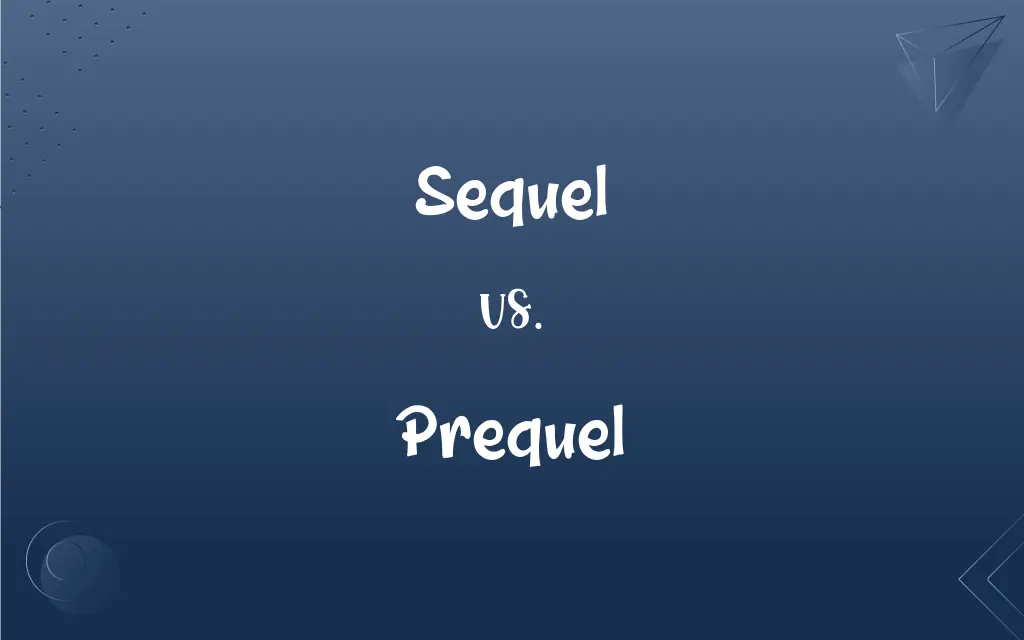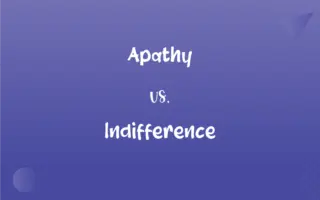Sequel vs. Prequel: What's the Difference?
Edited by Aimie Carlson || By Janet White || Updated on October 7, 2023
A story continuing a previous one. A story preceding an established narrative.

Key Differences
A sequel derives its essence from extension. It carries forward the storyline or thematic elements from its preceding work, ensuring the narrative progresses from an established point. Contrarily, a prequel delves back into time, exploring the backstories or events that have shaped the narrative of the original work, offering insights into what occurred before.
Typically, sequels are designed to continue a narrative, often expanding on the story's milieu, evolving characters, or introducing new challenges and arcs to navigate. On the other hand, a prequel tends to dissect the root causes or origins of characters or narrative elements, providing a new depth and perspective to the original story, often shedding light on motivations or past events.
A sequel often faces the challenge of maintaining the original’s charm while introducing fresh aspects to keep the audience engaged. The prequel, conversely, has to align its story adeptly with the established narrative, ensuring logical and coherent connections while revealing previously hidden layers to the original plot or characters.
Within the realms of a sequel, audiences may find the future projections of beloved characters or settings, potentially exploring their evolving relationships and challenges. In contrast, prequels tend to delve into a character’s past or how the world within the story was shaped, giving a new dimensional view and often answering lingering questions from the original.
Sequels may or may not retain original characters, sometimes introducing next generations or new faces into a familiar world. Prequels, while exploring the past, could introduce younger versions of known characters or unveil previously unknown entities that have significantly influenced the original story, enriching the initial narrative.
ADVERTISEMENT
Comparison Chart
Chronological Order
Follows the original story.
Set before the original story.
Character Development
Expands or evolves existing characters.
Explores origins or pasts of characters.
Story Arc
Continues or extends the initial narrative.
Explores antecedents of the original plot.
Audience Expectation
Anticipation of the future.
Insight into the backstory.
Typical Purpose
To progress the story forward.
To provide depth and context to the
ADVERTISEMENT
Sequel and Prequel Definitions
Sequel
An installment following an original, extending its plot, themes, or characters.
“The Godfather Part II” serves as a sequel, continuing the saga of the Corleone family.
Prequel
Literary or filmic work exploring origins or earlier events of the original narrative.
Star Wars: Episode I – The Phantom Menace is a prequel, exploring the earlier life of Anakin Skywalker.
Sequel
A piece crafted to carry forward the narrative of a preceding work.
“Harry Potter and the Chamber of Secrets” is a sequel that takes the readers on Harry’s second-year adventures at Hogwarts.
Prequel
A piece that explores the backstory or events leading to the original work.
“Fantastic Beasts and Where to Find Them” acts as a prequel to the “Harry Potter” series.
Sequel
Subsequent work maintaining characters or settings from the original.
“Mad Max: Fury Road” is a sequel in the Mad Max franchise, portraying further dystopian adventures.
Prequel
A narrative or filmic work set before the events of an existing story or series.
The Hobbit is a prequel to The Lord of the Rings, unfolding adventures that occurred prior.
Sequel
A successor narrative designed to further explore, expand, or develop a pre-existing story.
Finding Dory is a sequel to Finding Nemo, focusing on the character Dory and her journey.
Prequel
An installment that delves into what preceded, offering contextual depth to the original.
Monsters University is a prequel to Monsters, Inc., detailing the college days of Mike and Sulley.
Sequel
Something that follows as a continuation, especially a literary, dramatic, or cinematic work whose narrative continues that of a preexisting work.
Prequel
A work exploring previous timelines or backstories relevant to the original.
“Red Dragon” acts as a prequel to “The Silence of the Lambs”, exploring earlier cases of Hannibal Lecter.
Sequel
A result or consequence
"Our dreams are the sequel of our waking knowledge" (Ralph Waldo Emerson).
Prequel
A literary, dramatic, or cinematic work whose narrative takes place before that of a preexisting work in the same series.
Sequel
(dated) The events, collectively, which follow a previously mentioned event; the aftermath.
Prequel
(narratology) In a series of works, an installment that is set chronologically before its predecessor, especially the original narrative or (perhaps improper usage) any narrative work with at least one sequel.
Sequel
(narratology) A narrative that is written after another narrative set in the same universe, especially a narrative that is chronologically set after its predecessors, or (perhaps improper usage) any narrative that has a preceding narrative of its own.
Sequel
(mathematics) The remainder of the text; what follows. Used exclusively in the set phrase "in the sequel".
Sequel
Thirlage.
Sequel
(obsolete) A person's descendants.
Sequel
That which follows; a succeeding part; continuation; as, the sequel of a man's advantures or history.
O, let me say no more!Gather the sequel by that went before.
Sequel
Consequence; event; effect; result; as, let the sun cease, fail, or swerve, and the sequel would be ruin.
Sequel
Conclusion; inference.
Sequel
Something that follows something else
Sequel
A part added to a book or play that continues and extends it
Sequel
A literary or filmic work that continues a previously told story.
The Hunger Games: Catching Fire is the sequel to The Hunger Games, continuing Katniss Everdeen’s journey.
FAQs
Does a Sequel have to have the same characters as the original?
Not necessarily, though it often retains some characters or settings for continuity.
What is a Sequel?
A sequel is a literary or filmic work that continues a story previously established.
Can a series have multiple Sequels?
Yes, a series can have multiple sequels, often forming a trilogy or a franchise.
Can a Sequel have a different genre than the original?
While rare, sequels can sometimes explore different genres or tones while retaining core elements.
Is a Sequel always released after the original work?
Typically yes, a sequel is released after the original to continue its story.
Can a Prequel feature the same characters as in the original?
Yes, but often in a different context or time, exploring their pasts or origins.
How does a Prequel differ from a Sequel?
A prequel is a story that is set chronologically before an existing work, unlike a sequel which follows it.
Why are Prequels made?
Prequels provide backstory, offering insights into origins or events leading to the original story.
Are Prequels common in literature?
Yes, prequels are found in literature, often exploring character origins or world-building.
Does a Sequel always pick up where the original left off?
Not always, though sequels often continue the story, the timeline can vary.
What’s an example of a well-known Prequel?
"The Hobbit" is a well-known prequel to "The Lord of the Rings" series.
Are Sequels typically longer or shorter than the original?
There’s no standard; sequels can be longer, shorter, or similar in length to the original.
What’s a notable film Sequel?
"The Dark Knight" is a notable sequel in "The Batman" trilogy by Christopher Nolan.
Can a Prequel be written or made after a Sequel?
Yes, prequels can be made or written out of chronological order to provide additional context to a series.
What is a spiritual Sequel?
A spiritual sequel shares themes and styles with its predecessor without continuing the same story or characters.
Can a Prequel change audience perception of the original?
Yes, revealing backstories or origins in a prequel can cast the original in a new light.
What is the main challenge in creating a Prequel?
Ensuring consistency with the established story and revealing new, coherent information can be challenging.
Can a Sequel be successful independently of its predecessor?
Yes, some sequels can stand alone successfully, though they often leverage the original's context.
Can a series start with a Prequel?
Rarely. Usually, a prequel is developed after the original to delve into earlier events or contexts.
Can a character’s backstory in a Prequel differ from hints in the original?
Ideally, it should align for consistency, though sometimes prequels explore or expand upon aspects merely hinted at originally.
About Author
Written by
Janet WhiteJanet White has been an esteemed writer and blogger for Difference Wiki. Holding a Master's degree in Science and Medical Journalism from the prestigious Boston University, she has consistently demonstrated her expertise and passion for her field. When she's not immersed in her work, Janet relishes her time exercising, delving into a good book, and cherishing moments with friends and family.
Edited by
Aimie CarlsonAimie Carlson, holding a master's degree in English literature, is a fervent English language enthusiast. She lends her writing talents to Difference Wiki, a prominent website that specializes in comparisons, offering readers insightful analyses that both captivate and inform.































































